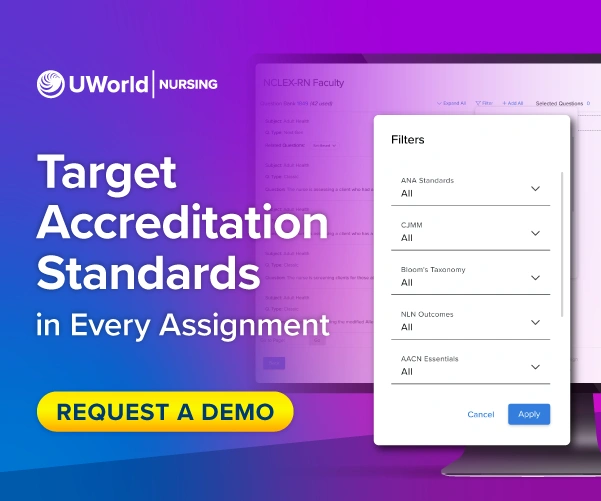What is NLN Accreditation?
![NUR-B2B-WEB-PLR-2024_12-Accreditation-[04]CNEA_Logo CNEA Logo](https://nursing.uworld.com/wp-content/uploads/elementor/thumbs/NUR-B2B-WEB-PLR-2024_12-Accreditation-04CNEA_Logo-r1n1duozique2adi5nrn2ecq9l7n6zttqeh964viv8.webp)
Home » Educators » The Importance of Nursing School Accreditation » What is NLN Accreditation?
The NLN CNEA evaluates nursing programs and provides a framework for achieving excellence in education. It ensures programs maintain a competitive edge while preparing nursing students for clinical and professional success.
NLN CNEA Accreditation Process
The NLN CNEA accreditation process involves a thorough review of a nursing program, assessing its curriculum, faculty qualifications, and student success rates so they meet the highest standards in nursing education.
What makes a program NLN accredited?
Nursing programs need to demonstrate compliance with several critical standards to achieve accreditation. Those include:
- Programs must have an extensive curriculum covering theory, clinical practice, and current healthcare developments while maintaining high educational standards.
- Programs must foster a student-centered, supportive environment that embraces diversity and admits students based on merit.
- Programs must have high student success rates, including licensure exam pass rates, graduation rates, and employment outcomes.
- Instructors must have relevant credentials, experience, and willingness for continuous learning to maintain role effectiveness.
- Institutions must show an ongoing commitment to innovation and improvement in nursing education.
Many states have NLN CNEA-accredited programs, including Santa Clarita Community College District in Santa Clarita, California; Beckfield College in Florence, Kentucky; West Coast University in Richardson, Texas; Vermont State University in Montpelier, Vermont; and Sandhills Community College in Pinehurst, North Carolina.
Benefits for NLN-Accredited Nursing Programs
An NLN accreditation benefits students and institutions.
For Students
Graduating from NLN-accredited programs gives students a vital edge in their careers. Accreditation ensures that a curriculum is equipped to prepare future nurses for real-world healthcare crises.
Employers prefer candidates who graduated from accredited programs, knowing they have the skills and knowledge to deliver exceptional patient care. Graduating from an accredited nursing program can facilitate students’ future academic progression goals and employment opportunities.
For Institutions
Institutions with NLN CNEA accreditation have an undisputed strategic advantage in the marketplace. The designation demonstrates a commitment to national and global nursing standards, which attracts students, faculty, and industry partners. It also ensures that programs follow evidence-based practices, foster innovation, and adapt to the ever-changing needs of healthcare.
- Top Quality: Accreditation provides benchmark quality assurance to the public and the program’s prospective and current students.
- Up-to-date Curriculum: NLN-accredited program curricula, teaching methods, and learning strategies are up-to-date, flexible, and reflective of societal healthcare needs.
- Access to Funding: Accredited nursing programs may be eligible to seek additional federal and state funding resources to support the program’s mission and goals.
Key Resources to Understand the NLN Accreditation Process
Educators and administrators can rely on a range of tools to navigate the accreditation journey.
The Accreditation Handbook outlines the policies and procedures essential for understanding the process, while free Professional Development opportunities, such as monthly webinars and workshops, help programs stay informed and prepared.
Hands-on support is available through:
- Workshops and Webinars: Gain insights into accreditation preparation and self-study writing. These sessions offer expert guidance on understanding the accreditation requirements.
- Accreditation Process Navigator: A peer mentor provided by NLN CNEA can guide your program through the accreditation process.
Familiarizing yourself with the Standards for Accreditation and using resources such as the self-study report guidance will ensure your nursing program stays on track for success.
NLN and Other Accreditations
NLN accreditation is a hallmark of excellence in nursing education. Choosing an NLN-accredited program is an investment in quality education and a brighter future in nursing.
| NLN Accreditation | NLN CNEA accreditation focuses on advancing nursing education through student-centered learning and evidence-based practices, making it ideal for smaller or community-based programs. |
| ACEN Accreditation | Accreditation Commission for Education in Nursing (ACEN) focuses on maintaining the quality and effectiveness of nursing programs at all levels, from practical nursing to clinical doctorates. |
| CCNE Accreditation | Commission on Collegiate Nursing Education (CCNE) focuses on ensuring the quality and integrity of nursing baccalaureate, graduate, and residency/fellowship programs. |




